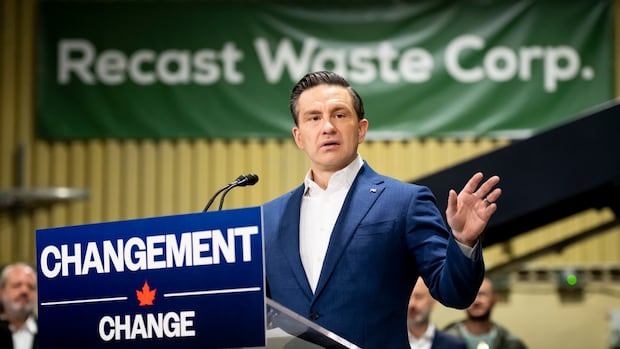End of Plastics Ban? Poilievre's Pledge Sparks Debate
Editor’s Note: Pierre Poilievre's recent pledge regarding Canada's plastics ban has ignited a firestorm of debate. This article delves into the implications of this promise.
Introduction:
Pierre Poilievre's Conservative Party platform includes a pledge to end the federal ban on single-use plastics. This announcement has sent ripples through environmental advocacy groups and industry alike, raising questions about the future of plastic waste management in Canada. This article will examine the details of Poilievre's pledge, its potential impacts, and the counterarguments put forth by environmentalists and supporters of the ban.
Why This Topic Matters:
The debate surrounding single-use plastics is a critical one. Plastic pollution is a global crisis, impacting marine ecosystems, wildlife, and human health. Canada's ban, while facing challenges in implementation, represents a step towards reducing plastic waste. Poilievre's promise to overturn this ban raises significant concerns about the country's commitment to environmental sustainability and its impact on international efforts to curb plastic pollution. The economic implications for both the plastics industry and recycling initiatives are also central to the discussion.
Key Takeaways:
| Point | Detail |
|---|---|
| Poilievre's Stance | Pledge to repeal the federal ban on single-use plastics. |
| Environmental Concerns | Increased plastic waste, harm to ecosystems, and potential setbacks in sustainability goals. |
| Economic Implications | Impact on recycling initiatives, the plastics industry, and potential job losses/gains. |
| Political Ramifications | Significant impact on the upcoming election and the perception of environmental policy. |
1. Poilievre's Pledge on Single-Use Plastics
Introduction: Poilievre's stance on the plastics ban is a cornerstone of his party's platform, framed as a response to concerns about economic burdens on businesses and consumers.
Key Aspects: The pledge focuses on repealing federal regulations restricting single-use plastics, arguing that the ban is overly burdensome and ineffective. The party advocates for market-based solutions and voluntary industry initiatives.
Detailed Analysis: Poilievre's arguments often cite the costs associated with complying with the ban and the perceived lack of substantial environmental benefits. He emphasizes empowering businesses to find their own solutions, suggesting that innovation and consumer choice should drive changes in plastic consumption. However, critics argue this approach lacks the regulatory framework needed to significantly reduce plastic pollution.
2. Interactive Elements on Poilievre's Plastics Policy
Introduction: The debate around Poilievre's pledge isn't just confined to policy documents; it's a dynamic discussion unfolding across various platforms.
Facets: The interactive aspects include social media debates, public forums, and media coverage analyzing the economic and environmental impacts. The pledge has also prompted responses from industry players, environmental groups, and other political parties, leading to a complex interplay of opinions and perspectives.
Summary: This interactive engagement highlights the significant public interest and the far-reaching consequences of the proposed policy change. The intensity of the debate underscores the importance of the issue.
3. Advanced Insights on Poilievre's Plastics Policy
Introduction: A deeper dive reveals complexities often missed in initial reactions.
Further Analysis: Experts in environmental science and economics offer contrasting views. Some argue that market-based solutions alone are insufficient to address the scale of the plastic pollution crisis, emphasizing the need for strong regulations to curb production and promote sustainable alternatives. Others suggest that over-regulation stifles innovation and economic growth. The analysis must also consider the global context—Canada's actions on plastic waste management have implications for international collaborations and commitments.
Closing: Understanding the long-term consequences of reversing the plastics ban requires a nuanced consideration of environmental, economic, and social factors, going beyond simple pro- or anti-regulation stances.
People Also Ask (NLP-Friendly Answers):
Q1: What is Poilievre's stance on the plastics ban? A: Poilievre pledges to repeal the federal ban on single-use plastics, advocating for market-based solutions instead.
Q2: Why is this plastics ban debate important? A: It addresses crucial environmental concerns about plastic pollution and raises questions about economic impacts and Canada's role in global sustainability efforts.
Q3: How could Poilievre's pledge benefit me? A: Proponents argue it could lead to lower costs for consumers and increased choices.
Q4: What are the main challenges with repealing the ban? A: Critics point to increased plastic waste, harm to the environment, and potential setbacks in sustainability goals.
Q5: How to get involved in the debate? A: Engage in informed discussions, contact your elected officials, and support organizations working towards sustainable solutions.
Practical Tips for Engaging with the Plastics Ban Debate:
Introduction: Understanding the complexities of this issue requires informed engagement.
Tips:
- Research credible sources of information (government reports, scientific studies, environmental organization reports).
- Analyze the arguments from different perspectives (environmental groups, industry representatives, political parties).
- Consider the long-term environmental and economic impacts of each proposed approach.
- Engage in respectful dialogue with those who hold differing views.
- Support initiatives promoting sustainable alternatives to single-use plastics.
Summary: Pierre Poilievre's pledge to end the plastics ban is a highly contentious issue with far-reaching implications for Canada’s environmental policies and its economic landscape. A thorough understanding of the arguments from all sides is crucial for informed engagement.
Call to Action: Ready to dive deeper? Share this article and join the conversation on social media using #PlasticsBanDebate #Poilievre #CanadianPolitics.

